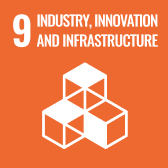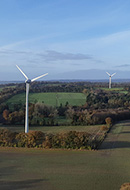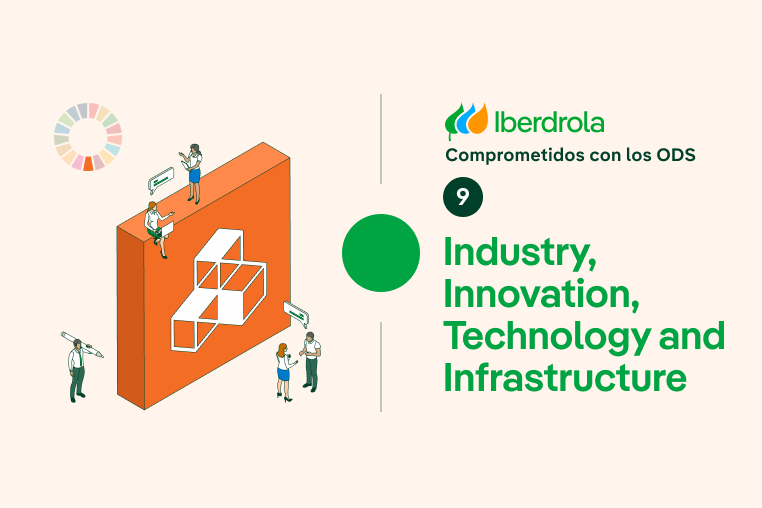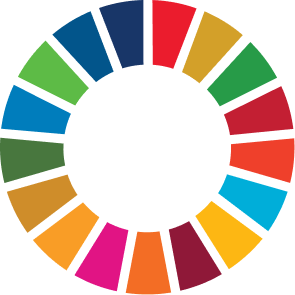SDG 9: Industry, innovation and infrastructure
We promote inclusive and sustainable industrialisation as a driver of employment and growth
Electrical network R&D Employment Renewable energy
Iberdrola is strongly committed to industry, innovation and infrastructure and contributes directly to achieving Sustainable Development Goal 9. The group is committed to accelerating its investments in renewable energy, digitisation and electric mobility to promote inclusive and sustainable industrialisation.
Goal 9: Industry, innovation and infrastructure. Video voice transcription (Spanish version) [PDF]
SDG 9: Industry, innovation and infrastructure - what is it and why is it so important?
SDG 9 refers to the need to build resilient infrastructure, promote sustainable industrialisation and foster innovation. To this end, it seeks to increase the contribution of industry to employment and GDP, doubling this contribution in the least developed countries, as well as to increase scientific research and modernise infrastructures.
According to the United Nations, inclusive and sustainable industry together with innovation and infrastructure are three fundamental pillars of sustainable development. They are also essential for the functioning of enterprises and, consequently, for economic and social development. The UN details, for example, that each manufacturing job creates 2.2 jobs in other sectors of the economy.
However, global manufacturing growth has been steadily declining and, following the recovery from the pandemic where the growth rate was 7.4 % in 2021, global manufacturing growth is estimated to have slowed to 3.3 %.
This is pointed out by the United Nations in its 2023 report on progress towards the SDGs, which also notes that global spending on research and development, although it increased significantly in 2020 —driven mainly by higher investments in research and development and substantial declines in countries' GDP— significant regional gaps remain. in research and development and substantial declines in countries' GDPs - significant regional gaps remain: the least developed countries (LDCs) and landlocked developing countries (LLDCs) spent about 0.27% and 0.20% of their GDP on research and development, respectively, compared to 2.62% in Europe and North America.
The number of researchers per million inhabitants has increased worldwide, from 1022 in 2010 to 1342 today, according to the report. However, women account for only 31.2% of researchers worldwide.
Progress will only be achieved with advances in technology, and this requires the promotion of sustainable industries and investment in scientific research and innovation. Good roads, reliable electricity, good sea and air connections, and universal Internet connectivity are the measures recommended by the UN to end this situation.
Addressing and reversing the current situation is an overarching goal at the international level. For this reason, building resilient infrastructure, promoting inclusive and sustainable industrialisation and fostering innovation have become SDG 9 of the 17 UN Sustainable Development Goals, adopted in September 2015 as part of the 2030 Agenda.
Iberdrola aligned with the Sustainable Development Goals
Keys to understanding the lack of R&D investment in in the world

-
More CO₂ emissions Carbon dioxide emissions (CO₂) from energy combustion and industrial processes grew by 0.9% globally and reached a new record high of 36.8 billion metric tons.
-
Connected population 95% of the world's population had access to a mobile broadband network, but some areas remain underserved.
-
More researchers The number of researchers per million inhabitants has increased worldwide from 1,022 in 2010 to 1,342 in 2020. However, women accounted for only 31.2% of this group.
Countries investing the most in innovation

- United States
- United Kingdom
- The Netherlands
- Germany
- Switzerland
- Denmark
- Sweden
- Finland
- Republic of Korea
- Singapore

Main causes
Ignorance that a country's sustainable, inclusive and social economic development goes hand in hand with investment in R&D; budget cuts in some countries; and bureaucratic difficulties in some regions to set up new businesses.

How can we put an end to it?
The public sector and private companies must provide funds to enable investment in research; we have to restructure the education system to foster the creation of ideas and new projects; and we must establish standards to ensure the sustainable management of business projects and initiatives and facilitate the procedures for forming new companies.
Sources: WIPO Innovation Index, UN and World Bank.
 SEE INFOGRAPHIC: Keys to understanding the lack of R+D investment in the world [PDF]
SEE INFOGRAPHIC: Keys to understanding the lack of R+D investment in the world [PDF]
SDG 9 targets: industry, innovation and infrastructure
The specific targets set for 2030 are:
- Develop high-quality, reliable, sustainable, and resilient infrastructure, with a focus on affordable and equitable access for all.
- Promote inclusive and sustainable industrialisation.
- Increase the contribution of industry to employment and GDP, and double this contribution in the least advanced countries.
- Modernise infrastructure and retrofit industries to become sustainable, using resources more effectively and promoting the adoption of clean and environmentally-rational industrial processes and technologies.
- Bolster scientific research and improve the technological capacity of the industrial sectors in all countries.
Our contribution to SDG 9: industry, innovation and infrastructure
For us, developing sustainable, reliable, resilient and high-quality infrastructures requires moving towards a green economy. That is why the company is committed to accelerating its investments in renewable energies, digitalisation and electric mobility as a path to economic and employment recovery.
- The company will support more than 500,000 jobs across its value chain through to 2030. It has also committed to increasing the presence of women in key positions to 35% by 2030 and to 43% on the Board of Directors.
- We are the world’s leading private energy company in R&D&I investment. Between 2019 and 2022 we invested more than €1.2 billion and aim to exceed €4 billion by 2030, thus doubling our investment in this area by the end of the decade.
- We are a global leader in the development and implementation of smart grids. In its Strategic Plan 2025-2028, the Group foresees an investment of €37 billion, mainly in the United Kingdom and the United States, and also in Brazil and the Iberian Peninsula. The focus will be on creating new transmission and distribution networks as well as upgrading existing infrastructure to guarantee the best service for customers.
- We have started up what will be the largest green hydrogen plant for industrial use in Europe, with an investment of €150 million.
- We have created the Global Smart Grid Innovation Hub, a global smart grid innovation centre to address the challenges of the energy transition and lead innovation in electricity distribution networks.
- We are one of the companies that most support start-ups throughout Europe, through the international PERSEO programme, with €125 million invested through our portfolio of investments in start-ups, our PERSEO Venture Builder unit, pilot projects and the launch of the Iberdrola NewTech Challenge.

Our innovation model
Committed to an innovation model for energy transformation.

The road to smart grids
A global transition to a green grid is underway.

Energy Transition as a Service
Energy services for companies to reduce their carbon footprint.

Internet of Energy
Innovation to improve energy efficiency.























